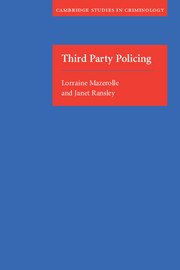Book contents
- Frontmatter
- Contents
- List of tables
- Acknowledgments
- 1 Governance, risk and crime control
- 2 Policing and the new regulatory state
- 3 Dimensions of third party policing
- 4 In the shadow of the law
- 5 Controlling drug problems
- 6 Controlling crime problems
- 7 Equity, side effects and accountability
- 8 Directions for the future
- Notes
- References
- Index
6 - Controlling crime problems
Published online by Cambridge University Press: 22 September 2009
- Frontmatter
- Contents
- List of tables
- Acknowledgments
- 1 Governance, risk and crime control
- 2 Policing and the new regulatory state
- 3 Dimensions of third party policing
- 4 In the shadow of the law
- 5 Controlling drug problems
- 6 Controlling crime problems
- 7 Equity, side effects and accountability
- 8 Directions for the future
- Notes
- References
- Index
Summary
Third party policing has wide applicability across a variety of different settings (places, situations and people) and across a variety of different types of crime. In this chapter, we continue presenting the results of our systematic review of third party policing interventions (described in Chapter 5), concentrating on four specific crime categories: tactics geared to reduce violent crime problems, third party policing strategies used to reduce juvenile offending, third party policing aimed at property crime and, finally, third party policing that seeks to reduce a generic set of problems in public places. For each of these four categories we examine the range of third parties co-opted, the types of laws invoked and the outcome of the third party policing interventions.
Violent crime problems
This section examines the effectiveness of third party policing in controlling a variety of violent crimes including assaults, robberies, domestic disputes and gun crimes. Our systematic review reveals five domains where the police have used third party policing tactics to control violent crime problems. These include third party policing tactics that engage businesses (e.g. bars, nightclubs), victims, public officials (e.g. school administrators, probation officers, local council officers), professional service providers (e.g. medical practitioners, lawyers, accountants), and finally, not-for-profit service providers (e.g. victim advocates, social service providers). In this section, we discuss each of these areas of third party policing that seeks to control violent crime.
- Type
- Chapter
- Information
- Third Party Policing , pp. 128 - 170Publisher: Cambridge University PressPrint publication year: 2006



